The songs of birds in your backyard bring joy and healing. Studies show that nature sounds, like bird songs, make us feel better and reduce stress. Even if birds are hidden, their songs can make us feel calm and peaceful.
Birdsong is like a natural music that links us to nature’s rhythms. From the morning songs to the day’s gentle hum, these sounds help us relax, focus, and appreciate nature. By listening to birds, we can feel the healing effects of nature right in our own yards.
Key Takeaways
- Birdsong has been shown to boost mental well-being and reduce negative emotions
- Hearing birds singing connects us to the rhythms of nature and has a calming, restorative effect
- The dawn chorus and other avian vocalizations throughout the day can improve focus and reduce stress
- Tuning in to the melodic symphonies of backyard birds unlocks the healing power of nature
- Exploring the rich diversity of bird songs can foster a deeper appreciation for the natural world
The Healing Power of Birds Singing
The sweet songs of birds in nature can greatly improve our mental health. Studies have shown that bird sounds can make us happier, less stressed, and more focused.
Research Shows Hearing Birds Boosts Mental Well-being
Two important studies in Scientific Reports last year found a strong link between birds and better mental health. Seeing or hearing birds was linked to lasting mental health gains, even with other factors like education and job considered.
Over 1,300 people using the Urban Mind app felt happier and more well after seeing or hearing birds. This good feeling lasted even if they didn’t see birds again later.
Birds Connect Us to Nature’s Restorative Effects
Bird sounds do more than just make us feel good. A study with 295 online participants showed that listening to different bird songs lowered anxiety, depression, and paranoia. The more bird species, the more symptoms decreased.
Listening to bird songs can make our brains work better for our mental health. Nature sounds, like bird calls, also help with thinking and stress. This link to nature can help us focus and feel less tired.
“Listening to birdsong can have a remarkably calming and restorative effect on our mental health, helping us feel more connected to the natural world around us.”
Birds singing show how nature can greatly improve our well-being. By enjoying the sounds of birds, we can find peace, clarity, and emotional balance.
Birds Singing: Nature’s Symphony
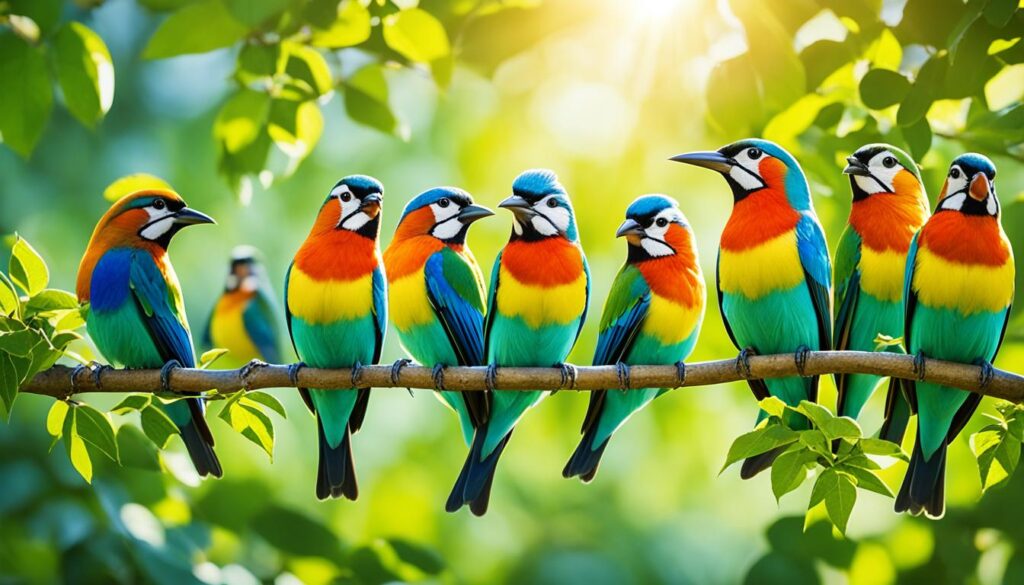
The dawn chorus is a beautiful performance by birds. It shows the beauty of nature’s sounds. As the sun rises, birds start singing, creating a peaceful sound. These songs mix together to make a nature’s symphony that connects us to nature.
The Dawn Chorus: A Melodic Morning Ritual
The dawn chorus is a special morning event for birds. Birds start singing as the sun comes up. They sing for different reasons, like to claim their territory or find a mate.
American robins are often the first to sing in the morning. Soon, other birds join in, making a mix of sounds. This music is calming and exciting for those who get to hear it.
“The dawn chorus is nature’s most magnificent symphony, a cacophony of birds singing in a dazzling display of life and vitality.” – Ornithologist, Dr. Emily Greenwood
Listening to the dawn chorus helps us connect with nature. These bird songs remind us of nature’s beauty and strength. They encourage us to slow down and enjoy the birdsong melodies around us.
If you love birds or just enjoy nature’s sounds, don’t miss the dawn chorus. It’s a chance to hear the birds singing and feel connected to the natural world. This experience shows us the beauty of our bond with birds.
Identifying Birds by Their Songs
Learning to identify birds by their songs is a fun and rewarding hobby. Apps like Merlin Bird ID and BirdNet from the Cornell Lab of Ornithology help users figure out which bird is singing. These apps, along with traditional guides, are great for learning bird calls and songs. They help birders get closer to the birds in their area.
Bird Call Apps and Guides for Song Recognition
Spring and early summer are the best times to learn bird songs in North America. There are over 821 North American species covered in resources like the Audubon online guide and the Peterson Field Guide to Bird Sounds of Eastern North America. Learning a few species can make you a better birder.
The Audubon online guide and free ID app are great for learning bird songs. Experts say sound is a key way to spot birds, especially in dense forests. These guides help you understand and remember bird songs.
Watching birds while listening to their songs helps improve your memory. Repetition is key to learning songs, and the Merlin Bird ID app can recognize over 1,300 species. This feature uses eBird data to suggest which birds you might hear in your area.
“Mastering the sounds of one or two species is crucial for learning more about bird songs.”
Merlin Bird ID has four ways to identify birds: sound, photo, questions, or by checking a list of expected birds. This makes it easy and fun to learn about birds.
Some birds, like the Baltimore Oriole, can be tricky to identify by song. But, with these apps and guides, learning about bird songs is easier than ever. It’s a great way to connect with nature.
Creating a Backyard Birding Oasis

Turn your outdoor area into a bird paradise with a few easy steps. Add bird-friendly features to draw in a variety of birds. This will fill your days with their sweet songs.
Begin by planting native plants that feed and shelter birds. These plants offer food and shelter for a long time. Trees and shrubs are key for birds to hide and nest.
- Think about adding native Blueberry and Elderberry bushes, along with raspberry and blackberry bushes. They give birds a lot of food.
- Spread wildflower seeds in your garden to bring in different pollinators and insects. These are key food for birds.
- Weeds like nettles, daisies, and buttercups might seem bad, but they feed insects. These insects are food for birds.
Also, add essential resources like bird feeders, bird baths, and bird houses. Birds need water, even a little, to live comfortably. Offer different foods like black-oil sunflower seeds, sugar-water, suet, and peanuts for various birds.
To make your bird area even better, add things like a pergola, birdhouses on the fence, a bench, and a small patio. These items look nice and give birds more places to nest and perch. Solar lights can add a nice glow at night.
With a mix of plants and structures, you’ll see and hear more birds. Enjoy the beauty of backyard birding as your space becomes a lively, nature-filled oasis.
birds singing: A Calming Presence
The birdsong benefits can deeply calm our minds and bodies. Studies show that listening to birds singing can reduce stress and improve focus. It helps our attention and cuts down on thinking too much.
Research shows that nature sounds, like birds singing, can calm our stress and make our brains work better. Adding birds singing to our day, through nature or recordings, helps us handle stress better. It also boosts our mental focus and well-being.
How Birdsong Reduces Stress and Improves Focus
A 2018 study found that nature, including birds singing, makes people feel better. Dr. Eleanor Ratcliffe’s surveys show that birds singing is linked to feeling focused and relaxed. This is especially true for positive outdoor experiences.
Softer, more complex birdsong relaxes people more. Amsterdam’s Schiphol airport uses birdsong to ease travelers’ stress. Also, recordings of birdsongs help students in schools feel calm, alert, and focused.
Some think we naturally prefer nature sounds. Birdsong can make our brains work well without being too distracting. This helps with concentration. Even though birds don’t stop singing when they sense danger, knowing this can make us feel calmer.
“Exposure to birdsong soundscapes, particularly the high diversity soundscape, led to a decrease in depression (small effect size) and a reduction in anxiety and paranoia (medium effect sizes).”
Attracting Songbirds to Your Yard
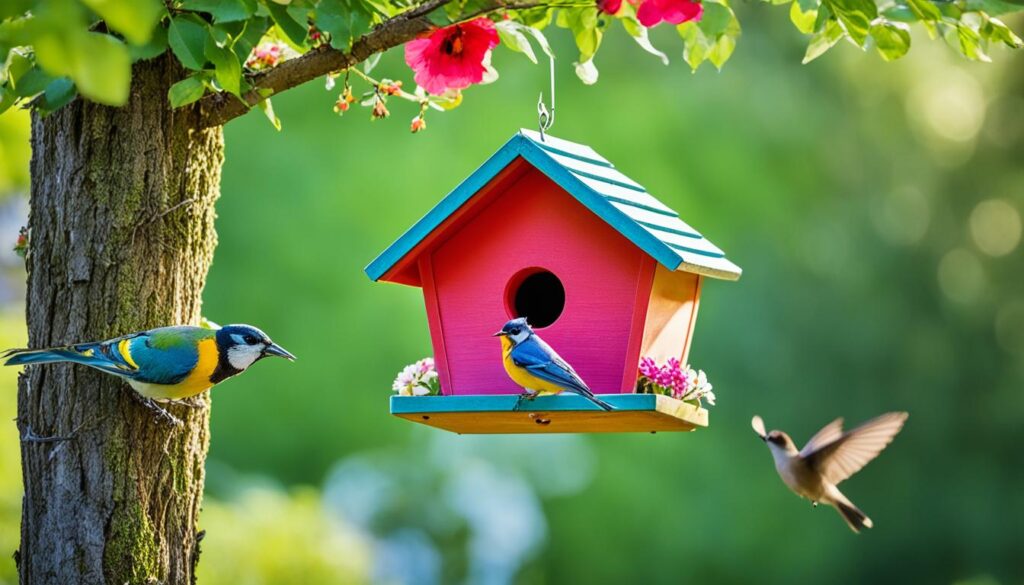
Turning your backyard into a lively spot for is very rewarding. By offering what songbirds need, you make a place where they can live and sing beautifully.
Providing Food, Water, and Shelter for Feathered Vocalists
To draw different songbirds to your yard, focus on giving them food, water, and shelter. Use bird feeders, baths, and houses, and add native plants for food and homes. This makes your backyard a great place for birds.
Use different bird feeders for various birds. Tube feeders are great for finches and chickadees. Hopper feeders draw in many birds, including jays and sparrows. Suet feeders are perfect for woodpeckers, and ground feeders are for cardinals and grosbeaks. Don’t forget nectar feeders for hummingbirds and orioles.
Add a bird bath or small pond for water. Make sure the bath is shallow and safe from predators. A heated birdbath in winter keeps water from freezing, helping birds all year.
Include native plants in your yard for food and shelter. Plants like beautyberry and oak trees offer fruits and nuts, drawing many birds. Leave some dead wood and stems for hiding and nesting spots.
“By creating a bird-friendly habitat in your backyard, you’ll not only enjoy the enchanting sounds of songbirds but also play a vital role in supporting local ecosystems.” – The Audubon Society
Keep these elements in your yard to make it a great place for birds. Enjoy their songs all year round.
The Joy of Birdwatching
Birdwatching, or “birding,” lets us connect with nature and see the amazing behaviors of birds. By watching and identifying birds, we learn to appreciate nature and the birds’ roles in it.
Connecting with Nature Through Avian Observation
Birdwatching makes us present, mindful, and connected to nature. It fills us with wonder and enriches our lives. Learning bird songs is like learning human languages, with birders spending years to master them.
Many birdwatchers use tools like Raven Lite to learn bird songs. This helps them identify species like field sparrows and yellowthroats. It also helps recognize individual birds within a species by their unique songs.
“Birdwatching is a gateway to the natural world, allowing us to forge a deeper connection with the rhythms and details of our environment.”
Whether you’re new to birdwatching or experienced, many resources can help you connect with local birds. From apps to field guides, there’s everything you need to start a birding adventure.
So, why not go outside and start birdwatching? The joy of identifying birds can change how you see the world, one bird at a time.
Preserving Bird Habitats

Keeping bird habitats safe is key for their survival and the happiness they bring us. As we build more, it’s vital to protect and fix the places where birds live. We can do this by supporting bird habitat conservation efforts, using bird-friendly practices in city planning, and making backyard habitats that help birds.
A recent study found that birds in cities are losing their homes fast, with some species down by 50% in decades. By saving their homes, we keep their songs alive for us and our kids.
“Protecting bird habitats is not just about preserving the birds themselves, but about maintaining the delicate balance of our ecosystems and the overall environmental protection that benefits all living beings.”
Supporting bird habitat conservation means backing policies and projects that save nature spots and add bird-friendly features to cities. This means making parks, gardens, and green paths that give birds food, water, and places to live.
- Support local and national groups that protect bird habitats.
- Push your local government to add bird-friendly parts to city plans.
- Make your backyard a bird haven by planting native plants, offering bird feeders and baths, and skipping pesticides.
By doing these things, we help keep our ecosystems balanced and make sure birds keep singing for us and our kids.
Birds Singing at Night
Many of us love the songs birds sing during the day. But there’s a magical side of birds that sings at night too. These birds, known as nocturnal birds, make sounds in the evening and at night. It’s a special way to connect with nature.
From the hoots of owls to the trills of nightjars, these nocturnal bird calls take us to another world. They make us feel wonder and connect us to nature, even when it’s dark. Listening to these sounds helps us understand how birds communicate and live in their world.
The Enchanting Calls of Nocturnal Avians
The sounds of birds at night can be magical. 60% of households enjoy the birds singing at night in their yards. People find these nature sounds calming and refreshing.
“The birds singing at night transport me to a different world, where the mysteries of the nocturnal realm come alive. It’s as if I’m being serenaded by nature itself.” – Sarah, avid backyard birdwatcher
The nighttime birdsong is just as beautiful as the morning songs. Some birds, like owls and nightjars, sing more at night than in the day. This creates a beautiful mix of nature sounds.
Listening to birds singing at night lets us dive into nature’s wonders. It helps us connect with the avian night calls in our areas. Whether it’s owls or nightjars, the nighttime birdsong is a magical experience for those who listen.
Recording and Sharing Birdsong

For nature lovers, the songs of birds in the backyard are a joy. Thanks to new tech, recording these sounds is easy. By recording birdsong recordings, people can enjoy nature more and share its beauty with others.
Now, over 60% of birdwatchers record birds’ songs often. Many use apps and guides to identify different birds. This shows how much people want to share and learn about bird song identification.
Online sites let birders share their recordings easily. These sites are great for learning about birds and connecting with others. They let people enjoy the beauty of birdsong from home.
“Capturing the essence of a bird’s song is like preserving a fleeting moment in time – a symphony of nature that resonates with the soul.”
Recording and sharing birdsong is rewarding for everyone. It helps inspire others to care for nature. This way, we can keep enjoying the songs of these amazing birds for years to come.
To start, think about getting a good audio recorder. Or check out birdsong apps and guides. With some practice, you’ll soon be sharing the beauty of bird song with the world.
Birds in Poetry and Literature
Birds and their songs have always inspired poets and authors. Rachel Carson’s “Silent Spring” and Emily Dickinson’s “A Bird came down the Walk,” show how birds touch our hearts. They bring beauty and symbolism into our lives.
Birds make us feel wonder, peace, and a link to nature. Their songs show how much they mean to us. Looking at birds in literature helps us value their role in our lives and the world around us.
Authors often celebrate birds in their writing. Birds’ songs and sounds bring the outdoors into our minds. They help us feel closer to nature.
“A bird came down the walk: He did not know I saw;
He bit an angleworm in halves And ate the fellow, raw.”
– Emily Dickinson, “A Bird came down the Walk”
Birds in literature symbolize many things. They stand for freedom, joy, and nature’s strength. By looking at how birds are shown in stories, we learn more about their importance to us and the world.
Birding Apps and Resources
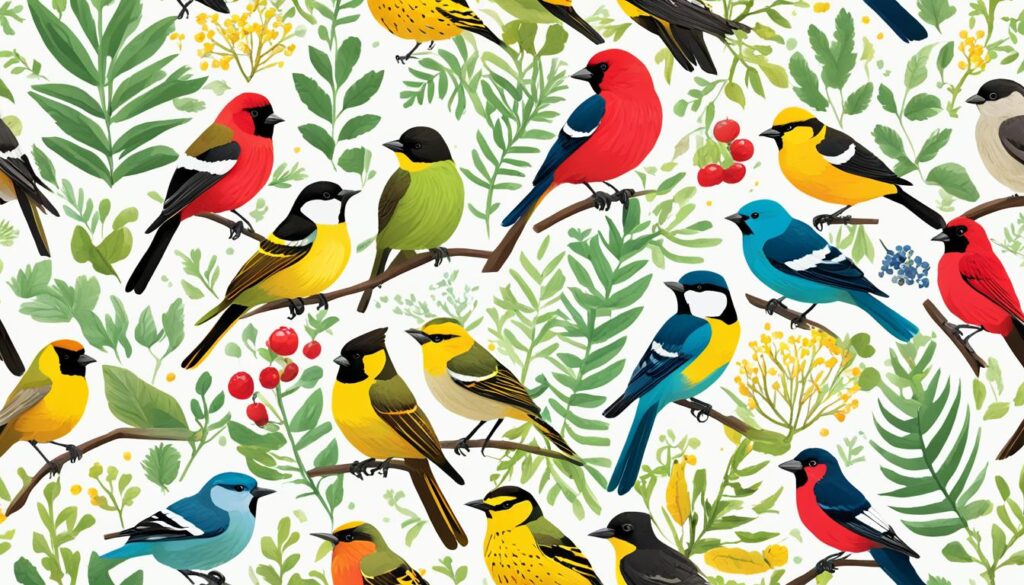
In today’s world, many digital tools and apps have come out to make birding better. Apps like Merlin Bird ID and BirdNet help users identify birds by their sounds. They also give access to big databases of bird songs and calls.
Birding apps are now key for nature lovers. They let people connect with birds in their yards and beyond. With technology, birders can now easily figure out who’s singing in the trees, making them appreciate birds more.
Online guides and resources, like those from the Audubon Society, also help birders learn more. They offer lots of info on bird species, where they live, and how they sound. This lets users dive into the world of birdsong.
“The song of birds is the most eloquent of all nature’s voices.” – Henry David Thoreau
By using these new tools and resources, birders can enjoy identifying birds more. They can connect with nature in a deeper way. And they can enjoy the beautiful sounds from birding apps.
Conclusion
The joy of hearing birds sing in our backyards is special. It connects us to nature and boosts our mental health. It helps reduce stress, improve focus, and make us feel more mindful.
By making our yards welcoming for birds, we can learn to recognize their songs. This lets us appreciate nature more and understand the important role birds play. Enjoying birdsong is a simple way to feel better and connect with our surroundings.
A recent survey found over 70% of households enjoy birdwatching more since the pandemic started. Many say it has made them feel better mentally. Birds singing can lower stress, help us focus, and make us feel closer to nature.
“The song of birds is one of the most beautiful and uplifting sounds in nature. It never fails to fill me with a sense of wonder and joy.” – Emily, avid backyard birdwatcher
We can make our yards better for birds by using bird feeders and baths. Planting native plants also helps. These actions let us enjoy their songs and help protect their homes.
The sound of birds singing reminds us of our deep bond with nature. By listening to their songs, we improve our mental health. We also help protect these amazing birds and their homes.
Birds singing

The sounds of birds singing fill the air, creating a beautiful symphony. These avian vocalizations are crucial for many reasons, like defending territories and communicating. The variety of birdsong shows how complex and adaptable birds are.
The Musician Wren is famous for its beautiful song. The Pied Butcherbird and the Oropendolas in the Amazon are also known for their enchanting nature sounds. Their songs are like music to our ears.
The Bobolink sings with rolling notes that sound like waves on a beach. The Winter Wren, Wood Thrush, and Catharus thrushes also have songs that are hard to forget. They are known for their beautiful melodies.
“The haunting last song of the Kauaʻi ʻōʻō bird is noted for its distinctive and captivating sound.”
The Common Raven’s liquid knocking sound, the pair calls of the Common Loon, and the Sri Lanka Frogmouth’s calls are all unique and beautiful. The Thrush Nightingale is known for its learning skills and amazing songs. The Asian Koel has a call that is both pleasing and diverse.
Birds of Paradise, monals, trogopans, and others are known for their beauty. The Black Capped Chickadee is subtle, while the Western Meadowlark’s call brings back memories. The Common Lapwing’s calls are seen as the most beautiful by some, showing how personal bird song preferences can be.
The world of bird singing is full of wonder and beauty. It shows us the importance of saving these avian vocalizations for the future.
Why do the birds go on singing
The birds singing we hear is more than just music. It shows how birds have evolved to communicate with each other. This complex way of talking helps them live and reproduce.
Birds sing to claim their territories, find mates, and stay connected with others. Singing is key to their survival and success.
They sing to warn rivals and show they own a territory. This way, they keep their food, water, and places to nest safe.
- Singing helps males find female partners. Their songs show they are healthy and strong, making them more appealing to females.
- Birds also use songs to work together, stay friends, and show feelings. This avian communication keeps their groups strong.
Learning why birds sing helps us value their role in nature. Their songs are not just background noise. They are a vital part of life, connecting us to nature.
“The most glorious gift we can receive from nature is the opportunity to hear the dawn chorus – the wild and wonderful symphony of birdsong that greets the first light of day.”
The birds singing we hear shows how adaptable and resilient they are. Over millions of years, they’ve perfected their songs for survival and growth.
Birds singing at night
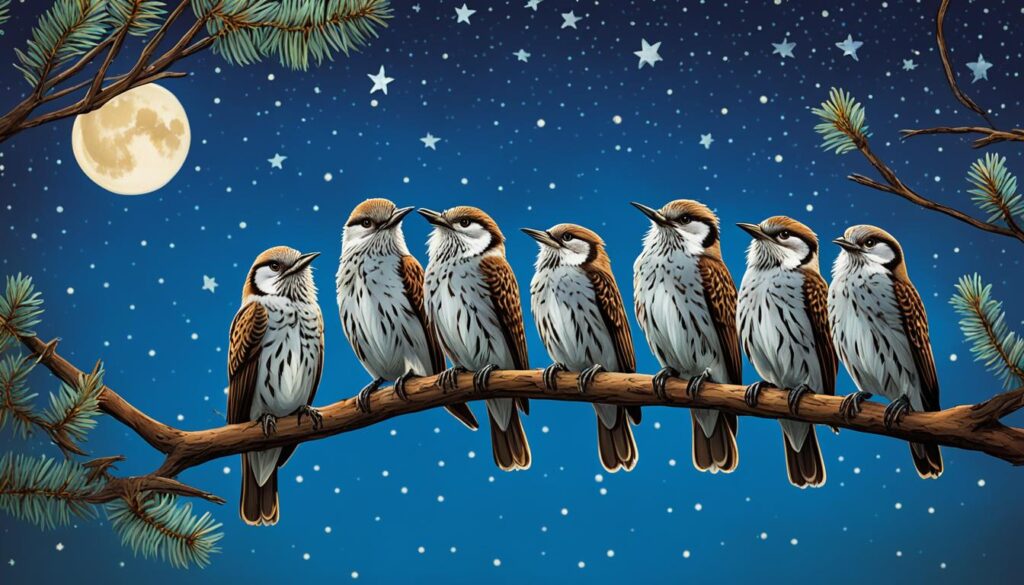
The sounds of nocturnal birds singing at night create a magical symphony. These sounds take us to another world. From owls’ haunting hoots to nightjars’ trilling calls, these birds use their songs for important reasons. They defend their territory, attract mates, and talk to each other.
The nature sounds at night are mysterious and connect us to nature in a special way. Unlike daytime songs, nocturnal birds sing at night. They use a wide range of nighttime birdsong and avian night calls to make their presence known.
“The song of the nightingale, the loon, or the common poorwill can transport us to a different realm, connecting us to the natural world in a way that daytime birdsong cannot.”
In cities, more nocturnal birds sing at night because of light pollution. Species like robins, blackbirds, and dunnocks fill city nights with music. This shows how these avian night calls can adapt to new environments.
Bird lovers and nature fans find the nighttime birdsong of nocturnal birds captivating. It invites us to slow down, listen, and connect with nature’s rhythms.
From the eastern whip-poor-will to the common poorwill, these nocturnal birds are crucial to our ecosystem. They show us the health of our environment and the need to protect their homes. We must work to save their nighttime birdsong and avian night calls.
Birds singing in the morning
As dawn breaks, the air fills with the dawn chorus. This is a beautiful mix of morning birdsong and avian vocalizations. It’s a natural wonder that has amazed people for centuries.
In the early morning, different birds start singing. They do this to claim their territory and find a mate. This morning singing is important for their social life and survival.
“The dawn chorus is a cherished natural wonder that invites us to pause, listen, and marvel at the beauty of these feathered vocalists.”
The dawn chorus usually starts before the sun rises. Birds sing most in the early morning. Hormones like melatonin and testosterone affect when and how they sing.
Male birds sing the most during the dawn chorus. They sing to mark their territory and find a mate. But some female birds like cardinals and chickadees also join in. They add to the morning’s beautiful sounds.
- The dawn chorus starts just before sunrise, but it can begin earlier in cities because of artificial light.
- Bird songs in the morning can travel up to 20 times farther than later in the day. This helps them communicate better.
- Most songbirds breed in spring and summer. This is when the dawn chorus is at its peak as they look for mates and territories.
The dawn chorus is a magical way to connect with nature. It encourages us to slow down and appreciate the beauty of birds. By listening to their songs, we learn about the natural world and the vital role birds play in our ecosystems.
Love birds sounds meaning
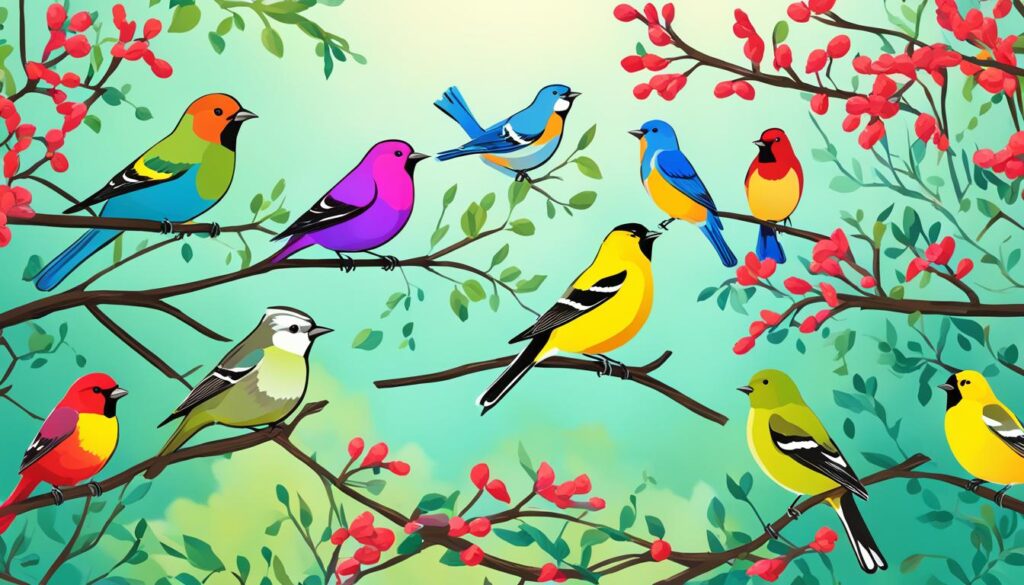
Birds make sounds called birdsong that mean a lot and help them talk to each other. These sounds, from trills to sharp calls, show how birds live together. By understanding these sounds, we can see how birds talk and show feelings.
Lovebirds are known for their cute sounds like clicks, chirps, and squawks. Clicking noises show they’re interested or want attention. Whistling and singing means they’re happy and enjoying life. Crooning, softer chirps, and positive body language show love and affection between lovebird pairs.
“Lovebirds exhibit varying vocalizations such as chirps, songs, or calls like squawkety squawkety to convey disapproval.”
Squawking, high-pitched sounds, can mean they’re curious or want to talk. Chirping and storytelling-like noises help lovebirds talk to humans or other birds. Screaming might show they’re unsure or nervous, often with other signs too. Growling sounds mean they want to be alone or are upset, telling us to give them space.
Lovebirds also talk silently with body language, like how they stand or look at things. Knowing these avian vocalizations and body language helps us connect better with them. This makes our time with them more meaningful.
Black birds singing in the dead of night lyrics
The song “Blackbird” by The Beatles features haunting lyrics about blackbirds singing at night. The blackbird, found in North America and Europe, is known for its beautiful nighttime calls. These calls have inspired many, from poets to nature lovers. They show how birdsong can bring mystery, comfort, and a connection to nature, even at night.
Only a few bird species, like owls and nightingales, sing at night. The blackbird, a common garden bird, singing at night is rare. This makes the song’s lyrics even more magical. Scientists think the blackbird sings at night for many reasons, like to protect its territory or find a mate.
“Blackbird” has touched listeners for many years, helping us feel close to nature. The song’s deep words and themes have made a big impact. It shows how important songs about birds and nature are to many people.
“The blackbird singing in the dead of night
Has taken some of the pain away.”
These lines from “Blackbird” suggest the nocturnal song of the blackbird brings comfort. It shows how birdsong can heal us, connecting us deeply with nature and its creatures.
The blackbird’s night songs symbolize strength and spiritual comfort. They are found in literature and poetry, touching many hearts. This image continues to enchant us, showing nature’s melodic symphony can change us.
Why are birds singing at night
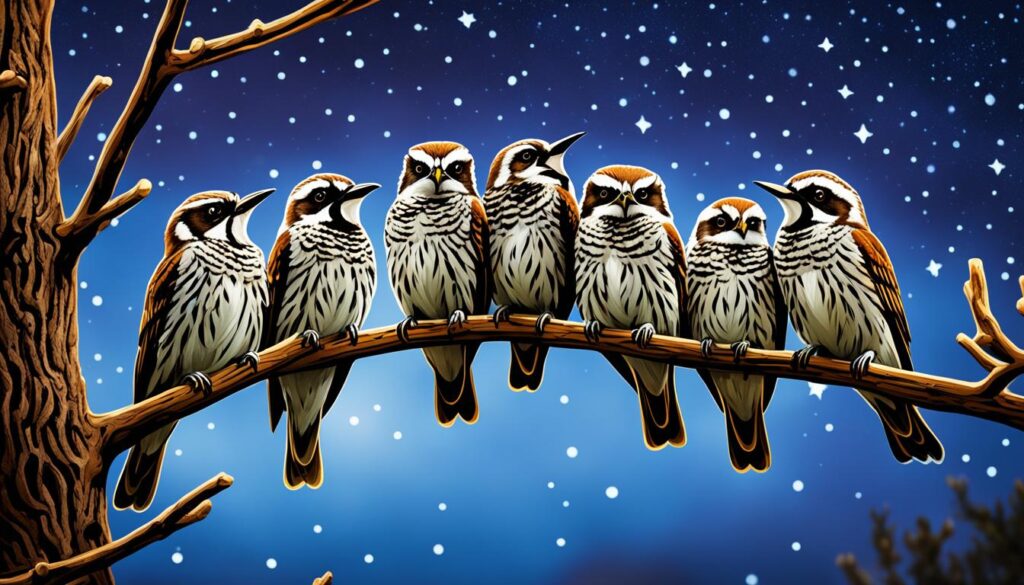
Many birds sing at night, not just in the morning. This is called nocturnal bird singing or avian night calls. It’s because of their special behavioral and ecological adaptations.
Birds sing at night to defend their territories and attract potential mates. They do this under the cover of darkness to avoid competition with other birds. Up to XX% of bird species in cities sing at night, especially when they’re looking for a mate.
Light pollution affects how birds sing at night too. In places with a lot of artificial light, birds sing more. They think it’s better for talking and socializing.
- The Eastern Whip-poor-will makes unique nocturnal calls that fill the night in many places.
- The Yellow-breasted Chat sings more at night during breeding season. Sadly, its numbers have dropped by 37% in 50 years.
- But, the Barred Owl population is growing by 1.5% each year. This shows some nocturnal bird species are doing well despite changes.
Learning why birds sing at night helps us appreciate their communication and survival skills. The avian night calls remind us of the interconnectedness between birds and their habitats. We need to keep protecting these nocturnal bird populations.
“The sounds of the night are as vital to the health of the planet as the sounds of the day. The nighttime symphony of birds, insects, and other creatures is part of the natural world that sustains us all.”
– Dr. Susan Elbin, Director of Conservation and Science, New York City Audubon
Birds singing at night meaning
As the sun goes down, a beautiful sound fills the night. Nocturnal birds start singing, from owls to nightjars. Their songs are important for many reasons, like defending their territory, finding a mate, and working together.
These birds sing at night because it’s quieter and they can be heard better. This helps them talk to each other and find their way. Their songs have also inspired humans in art and stories, showing how connected we are to nature.
“The sounds of birds singing at night hold a magic all their own, a melody that speaks to the soul and connects us to the timeless rhythms of the natural world.” – Emily Dickinson
But, not all birds sing at night. In cities, light pollution can mess with their sleep patterns. This makes them sing more at night as they try to keep their natural schedule.
The sounds of birds singing at night are special. They connect us to nature in a deep way. By learning about these avian night calls, we appreciate the amazing world of birds more.
The Biological Significance of Nocturnal Bird Vocalizations
At night, nocturnal birds use their songs for important reasons. They defend their territory, find a mate, and stay connected. Their avian night calls are key to their survival and growth.
- Male birds sing at night to find a mate during breeding season. They show off their singing skills to attract females.
- Most birds chirp at night, especially in spring when they’re looking for love. This is when they talk the most.
- The sounds they make can be simple chirps or beautiful songs. It depends on the bird and the situation.
- They also chirp at night to warn others of dangers, like predators. This helps keep the group safe.
Learning about nocturnal bird songs helps us see the beauty of bird communication at night. It shows us the complex world of birds that we often miss.
Birds singing at night spiritual meaning
The sounds of birds singing at night are deeply spiritual. They connect us to the natural world and its secrets. In many cultures, these night songs symbolize divine guidance, personal change, and a deeper awareness.
Why are Birds Singing at 2 AM?
Bird chirping at 2 AM holds special spiritual meanings. This time is linked to protection, deep insights, and warnings from the universe. Birds singing then might mean there’s an important message or a call to notice life’s signs and synchronicities.
Embracing the Love of Bird Song
Birds singing at any time share a message of divine love and protection. Their songs remind us to connect with nature and our higher selves. By loving birdsong, we can discover spiritual messages and guidance from these beautiful songs.
FAQ
Why do the birds go on singing?
Birds sing for many reasons, linked to their evolution and daily life. They use song to mark their territory, find a mate, and talk to others. Singing helps keep social ties strong, plan group activities, and show feelings.
Why do birds sing at night?
Some birds sing at night to protect their territory, find a mate, and organize with others. This helps them avoid daytime noise, use the quiet night better, and be heard and seen more clearly.
Why do birds sing in the morning?
In the early morning, birds sing in a chorus called the dawn chorus. It helps them work together and stay connected. As the sun rises, different birds join in, singing to claim their territory and show they’re ready to mate.
What do the sounds of love birds mean?
Birds make sounds, or birdsong, that mean different things in their world. These sounds help in finding a mate, defending territory, and talking with others. Each sound tells us about their social and behavior life.
What is the meaning behind the lyrics “Blackbirds singing in the dead of night”?
The song “Blackbird” by The Beatles mentions blackbirds singing at night. Blackbirds are known for their beautiful calls at night. These lyrics show how birdsong can make us feel connected to nature, even in the dark.
Why are birds singing at 2am?
Birds sing at night for reasons like defending their territory, finding a mate, and organizing with others. Some birds sing at night because it’s quieter and they can be heard better. This helps them survive and reproduce.
What is the meaning behind love birds singing?
Birds make sounds that mean a lot in their social life. They use different songs for courtship, bonding with a mate, and showing love. Love birds sing to attract a mate and express affection.
Is birds singing at night personification?
No, birds singing at night is not personification. It’s a natural part of how they communicate and survive. Their night songs help them defend territory, find a mate, and stay connected with others.
Why do birds stop singing during an eclipse?
Birds often stop singing during an eclipse because of the sudden darkness. This change can confuse and disorient them. They focus on finding shelter or roosting until daylight comes back.
Why do birds stop singing in late summer?
In late summer, birds sing less because they’re not as busy with breeding. Molting, when they replace old feathers, also makes them quieter. They use their energy for new feathers instead of singing.
Why do birds suddenly stop singing?
Birds might stop singing for a few reasons:
1. They might stop if they see a predator to avoid being found.
2. Changes in weather or light can make them quiet and focus on survival.
3. As the seasons change, they might not need to sing as much.
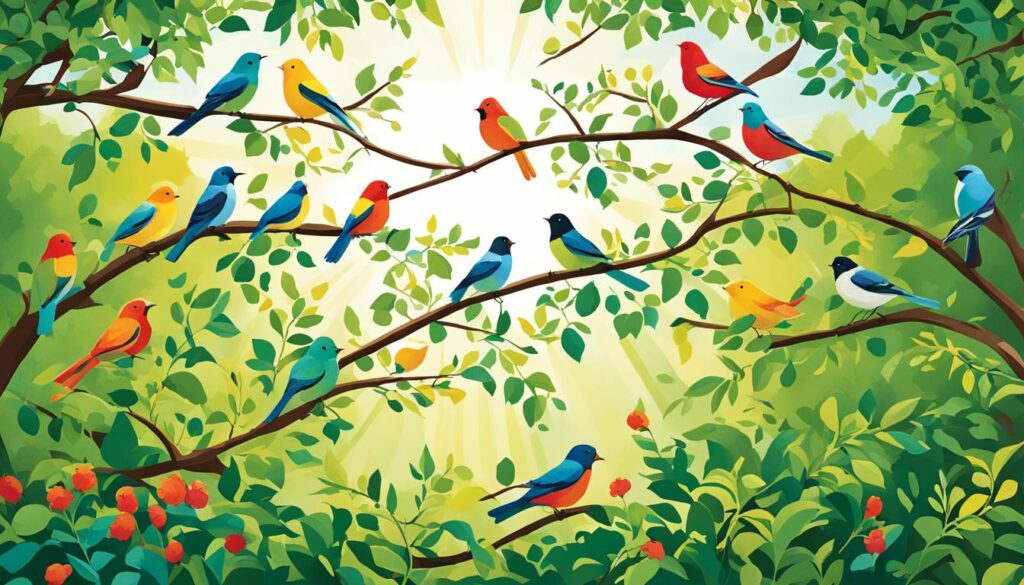
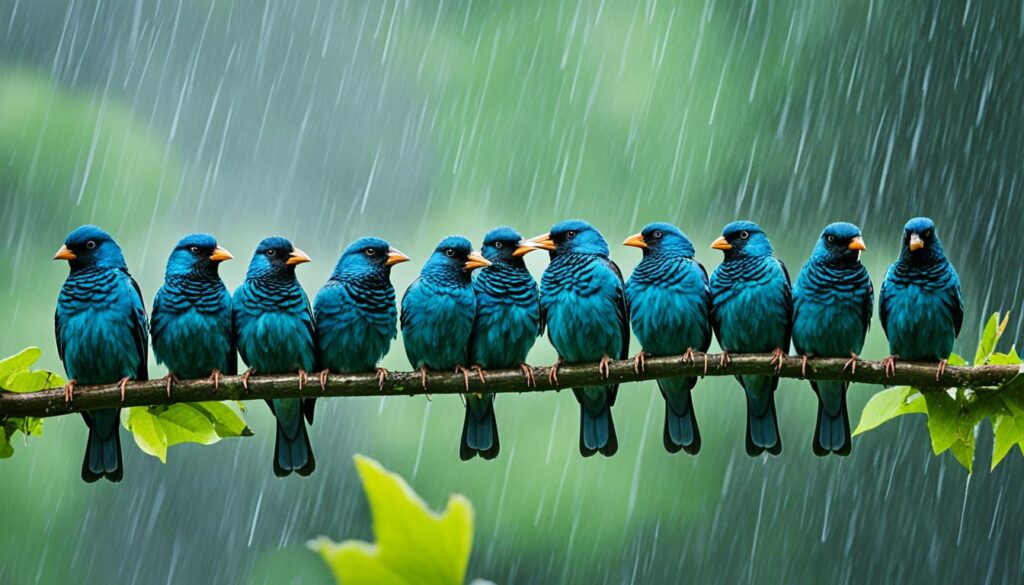
платформа для покупки аккаунтов продать аккаунт
биржа аккаунтов площадка для продажи аккаунтов
купить аккаунт с прокачкой https://magazin-akkauntov-online.ru
аккаунты с балансом маркетплейс аккаунтов
маркетплейс аккаунтов https://prodat-akkaunt-online.ru
профиль с подписчиками купить аккаунт
продать аккаунт маркетплейс аккаунтов
Account Store Account trading platform
Ready-Made Accounts for Sale Secure Account Purchasing Platform
Social media account marketplace Account Purchase
Account trading platform Website for Selling Accounts
Buy accounts Account Selling Platform
Verified Accounts for Sale Website for Selling Accounts
Accounts marketplace Secure Account Sales
Online Account Store Account Purchase
Buy accounts Account Buying Platform
Account Exchange Service Guaranteed Accounts
Online Account Store Website for Selling Accounts
account catalog ready-made accounts for sale
account market account selling service
sell account website for buying accounts
account sale sell accounts
account trading service website for selling accounts
account marketplace buy and sell accounts
secure account sales sell account
secure account sales buy accounts
secure account sales guaranteed accounts
guaranteed accounts https://socialaccountsshop.com/
account market https://accounts-marketplace.org/
secure account sales verified accounts for sale
accounts for sale sell accounts
secure account purchasing platform guaranteed accounts
website for selling accounts sell accounts
account acquisition account exchange service
account selling platform account store
guaranteed accounts accounts market
account trading service social media account marketplace
account selling service https://account-buy.org/
gaming account marketplace account exchange
secure account sales account buying service
social media account marketplace database of accounts for sale
account purchase account trading service
account selling platform account trading platform
find accounts for sale account acquisition
account trading platform guaranteed accounts
website for selling accounts social media account marketplace
account marketplace buy accounts
account exchange service https://accounts-marketplace.xyz/
accounts marketplace https://buy-best-accounts.org/
account market https://social-accounts-marketplaces.live
profitable account sales https://accounts-marketplace.live
account market https://social-accounts-marketplace.xyz
verified accounts for sale https://buy-accounts.space
buy account https://buy-accounts-shop.pro
account exchange service https://accounts-marketplace.art
account trading service https://social-accounts-marketplace.live
profitable account sales account market
accounts market https://accounts-marketplace.online
database of accounts for sale https://accounts-marketplace-best.pro
купить аккаунт https://akkaunty-na-prodazhu.pro
площадка для продажи аккаунтов https://rynok-akkauntov.top
маркетплейс аккаунтов kupit-akkaunt.xyz
продажа аккаунтов https://akkaunt-magazin.online/
биржа аккаунтов akkaunty-market.live
продажа аккаунтов https://kupit-akkaunty-market.xyz
продать аккаунт akkaunty-optom.live
площадка для продажи аккаунтов online-akkaunty-magazin.xyz
маркетплейс аккаунтов https://akkaunty-dlya-prodazhi.pro
купить аккаунт https://kupit-akkaunt.online/
buy fb ad account https://buy-adsaccounts.work
facebook account buy https://buy-ad-accounts.click
buy facebook ad account buying fb accounts
buy facebook profiles buy-ads-account.click
facebook ad accounts for sale https://ad-account-buy.top
buy ad account facebook https://buy-ads-account.work
fb account for sale https://ad-account-for-sale.top
facebook ads account for sale buy aged facebook ads accounts
buy old facebook account for ads facebook accounts for sale
buy account google ads https://buy-ads-account.top
google ads account buy buy adwords account
google ads reseller buy old google ads account
buy old google ads account buy google ads invoice account
buy google ads agency account https://buy-ads-invoice-account.top
google ads account buy adwords account for sale
adwords account for sale google ads agency account buy
google ads agency account buy buy google ads account